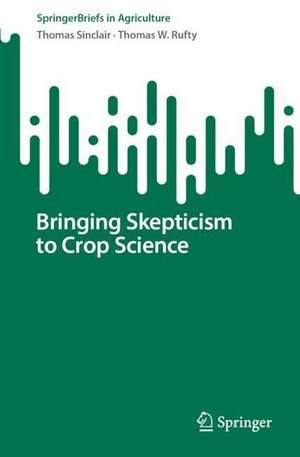Bringing Skepticism to Crop Science: SpringerBriefs in Agriculture
Autor Thomas Sinclair, Thomas W. Ruftyen Limba Engleză Paperback – 3 ian 2023
Din seria SpringerBriefs in Agriculture
-
 Preț: 381.00 lei
Preț: 381.00 lei -
 Preț: 355.49 lei
Preț: 355.49 lei -
 Preț: 376.43 lei
Preț: 376.43 lei -
 Preț: 348.72 lei
Preț: 348.72 lei -
 Preț: 377.18 lei
Preț: 377.18 lei -
 Preț: 379.30 lei
Preț: 379.30 lei -
 Preț: 376.22 lei
Preț: 376.22 lei - 15%
 Preț: 462.05 lei
Preț: 462.05 lei -
 Preț: 355.07 lei
Preț: 355.07 lei -
 Preț: 376.04 lei
Preț: 376.04 lei -
 Preț: 388.24 lei
Preț: 388.24 lei -
 Preț: 343.51 lei
Preț: 343.51 lei -
 Preț: 379.68 lei
Preț: 379.68 lei -
 Preț: 377.18 lei
Preț: 377.18 lei -
 Preț: 374.30 lei
Preț: 374.30 lei
Preț: 375.45 lei
Nou
Puncte Express: 563
Preț estimativ în valută:
71.86€ • 78.09$ • 60.41£
71.86€ • 78.09$ • 60.41£
Carte tipărită la comandă
Livrare economică 21 aprilie-05 mai
Preluare comenzi: 021 569.72.76
Specificații
ISBN-13: 9783031144134
ISBN-10: 3031144139
Pagini: 66
Ilustrații: VI, 66 p. 32 illus., 17 illus. in color.
Dimensiuni: 155 x 235 mm
Greutate: 0.12 kg
Ediția:1st ed. 2022
Editura: Springer International Publishing
Colecția Springer
Seria SpringerBriefs in Agriculture
Locul publicării:Cham, Switzerland
ISBN-10: 3031144139
Pagini: 66
Ilustrații: VI, 66 p. 32 illus., 17 illus. in color.
Dimensiuni: 155 x 235 mm
Greutate: 0.12 kg
Ediția:1st ed. 2022
Editura: Springer International Publishing
Colecția Springer
Seria SpringerBriefs in Agriculture
Locul publicării:Cham, Switzerland
Cuprins
Chapter 1 The Role of Skepticism in Science?.- Chapter 2 Warnings for Skeptics.- Chapter 3 Photosynthesis.- Chapter 4 Seed Number.- Chapter 5 Nitrogen Use Efficiency.- Chapter 6 Water Use Efficiency.- Chapter 7 Water Loss.- Chapter 8 Unconfirmed Field Observations (UFOs).
Notă biografică
Thomas Sinclair has a 50-year career in crop science and has published on several topics that have contributed to the advancement of the science.
Textul de pe ultima copertă
Global food production and climate change among other concerns are societal issues that require major research input from crop science. While suggestions are abundant on how crop science can help to resolve these issues, many of the suggestions come from people who are not actually familiar with the challenges and requirements to modify crop plants grown under field conditions to achieve the necessary improvements. Efforts to alter a gene or even several genes have very rarely proven successful in having impact on crop production under realistic field conditions. This lack of success has not been addressed head on. This book serves as a reminder to crop scientists and others that open, clear-minded assessments of the entirety of evidence concerning a hypothesis is required before making claims of possible increases in crop performance. This attitude of skepticism is not a negative attitude but rather an employment of the cornerstone of scientific investigation based on formation and evaluation of hypotheses. Skeptical analyses are to be presented in the book on some of the common suggestions for improving crop plants. The six specific topics to be addressed are photosynthesis, seed number, nitrogen use efficiency, water use efficiency, crop water loss, and unconfirmed field observations. Each of the topics in this book, will first be reviewed to present the origins of the popular assumptions about how specific plant modification will result in improved crop performance. The review of the background information will be followed by an examination of the evidence, logic, and predicted outcomes for the assumed benefits of the modifications. Finally, each chapter will offer novel, alternate approaches to plant modification that have documented support for positively impacting crop performance. The book will not be written in specialized, detail language but offer access for those with a wide range of interests in options for increasing crop production in the future.The goal of the book is to provide information that is useful to those with interests ranging from climatologist to food-oriented sociologists. Of course, the topics covered will be of direct interest to those studying plant sciences, particularly crop scientists. The hope is to challenge a reader to re-examine some of her/his assumptions about crop improvement and approach the topic with a renewed practice of skepticism in formulating and evaluating hypotheses.
Caracteristici
Skeptical evaluation of prominent ideas for increasing crop yield Offers new perspectives on improving crop performance based on key physiological traits Offers novel priorities for achieving crop improvements to meet societal challenges
